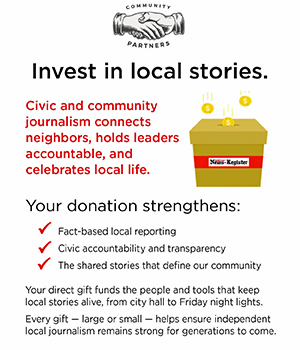The rush from racing not worth a lifetime of regret
The decisions made by two young men to engage in a high-speed street-racing episode will forever haunt a number of local families.
Jeremy Hopper and Andrew Olsen were seeking thrills and bragging rights last May as they sped north on Highway 99W, playing what one witness likened to “a game of cat-and-mouse.”
A crash re-enactment team estimated Hopper’s car was going 100 mph when he lost control and slammed into an oncoming van. Experts say the impact at 100 is around four times that of 50, not just double. So it’s not surprising the crash claimed one person and inflicted critical, life-altering injuries on another.
After accepting a plea deal, Olsen is expected to be handed a five to seven year prison sentence. Hopper’s case went to trial, and a jury didn’t need long to find him guilty on multiple counts, including first-degree manslaughter.
Given the facts of the case, we have no dispute with the jury’s finding, or with the resulting 12-year prison sentence. Friends and relatives found that either too lenient or too harsh, depending on which side their affiliation lay.
Judge Andrew Erwin, brought in from Washington County, also stripped Hopper of his driving privileges for life — a tough condition for such a dedicated car enthusiast. But we have no quarrel with it. In fact, we hope Olsen receives a lifetime revocation as well.
What of the car club, which, according to Olsen’s testimony, gathered in the Goodwill parking lot that fateful night? How many members knew the two twenty-somethings from their ranks were headed out for a street race? How many have participating in of street races themselves?
We don’t ask in an attempt to lay blame. We ask because such questions must be considered to prevent such tragedies from recurring.
Anyone who has raced on a public street must put him or herself in the shoes of Hopper and Olsen. He or she must consider whether the thrill is worth the risk of years in prison and the knowledge that an innocent person died as a result.
Make no mistake. Weaving through traffic at triple-digit speed is as dangerous as driving drunk. It can be as reckless as firing a loaded gun into a crowd. It’s an action that has no place in our communities. We need to drive that home to youth, along with the dangers of intoxicated and distracted driving.
The endless debate about whether guns kill people or people kill people can be twisted in this case to ask if speedy car culture kills people or drivers kill people.
But that means nothing to Bonifacio Martinez, who will be haunted by the memory of reaching out to his deceased friend while trapped in a mangled car. Nor to Natasha Fisher, who will never regain her former vibrancy. Nor to their friends and relatives.
Justice was served. But for them, the pain never fades.
We hope the next time someone seeks an adrenaline rush on local streets, he’ll recall this case and reconsider.













Comments